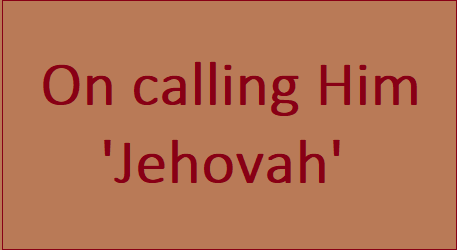On calling Him 'Jehovah'

Marcel Craig, of Brooklyn, New York, asked this question:
“THOUGH I CONSIDER myself as having a religion, I must admit that I have little knowledge about God and the Bible. … One of my friends once told me that whoever shall worship Jehovah, call on the name of Jehovah, and be called by the name Jehovah, as in Jehovah’s Witnesses, will be saved. This makes me uncomfortable for I’m not used to calling God by that name in my prayers. So, I want to ask your stand on addressing God by the name Jehovah. And how does the Church of Christ address our Lord God?”
Richard J. Rodas, Editor-in-Chief of God’s Message Magazine replies:
“Thank you for asking us on matters concerning God and how to address Him.
The Jehovah’s Witnesses, as a religious group, is indeed known for strictly using the name “Jehovah” in addressing Go. Some of its zealous members, in trying to promote their faith, even go as far as claiming that one will not be saved unless he calls God by that name. Such serious assertion indeed calls for profound critical investigation as regards the use of “Jehovah” in reference to God.
What do Bible scholars and historians of religion say about the use of the name “Jehovah”? As to age, the Rotherham Emphasized Bible reports, “The pronunciation Jehovah was unknown until 1520, when it was introduced by Galatinus; but was contested by Le Mercier, J. Drusius, and L. Capellus, as against grammatical and historical propriety … which is merely a combination of the sacred Tetragrammaton and the vowels in the Hebrew word for Lord” (Ibid., pp. 24-25). The Harper’s Bible Dictionary corroborates by stating, “The hybrid word ‘Jehovah’ is a combination of the vowels of ‘Adonai’ with the consonants of the Tetragrammaton; its appearance in the JKV was the result of the translators’ ignorance of the Hebrew language and customs” (p. 1036, emphasis ours.) Hence, as The New Schaff-Herzog Encyclopedia of Religious Knowledge aptly concludes, “JEHOVAH” is “an erroneous form of the divine name of the covenant God of Israel which appears first about 1520 A.D.” (Vol. VI, p. 16, emphasis ours). Explanation on the occurrence of the erroneous form of God’s name in the Bible is stated in The New International Dictionary of New Testament Theology:
“The form Jehovah arose out of a misunderstanding which in turn arose out of the reluctance of pious Jews to pronounce the divine name (c. 300 b.c.). Instead they uttered the word ,adōnāy my Lord. In the MT [Masoretic Text] the divine name was written with the consonants of YHWH and the vowels of
,adōnāy, as a reminder to say the latter whenever the word was read. The divine name appears as yehōwâh in the MT. The LXX [Septuagint] reflects the Jewish reluctance to pronounce the divine name and puts the word kyrios Lord, in its place. The RSV and other Eng. versions also reflect the practice by giving the word LORD in capital letters whenever the name YHWH stands in the text. The Lat. Likewise gives the word Dominus, Lord, for YHWH. The form Jehovah is thus a malformation giving what is virtually a transliteration of a word which is found in the text of the Heb. OT, but which was never actually used as a word.” (Vol. II, pp. 69-70, emphasis ours)
Finally, the late Distinguished Service Professor of Talmud and Rector of the Rabbinical School in Jewish Theological Seminary of America, Saul Lieberman, Ph.D., identified openly how the rendition ‘Jehovah’ came to be. Writing for Microsoft Encarta, he expounded:
“Jehovah, name of the God of the Hebrew people as erroneously transliterated from the Masoretic Hebrew text. The word consists of the consonants JHVH or JHWH, with the vowels of a separate word, Adonai (Lord). What its original vowels were is a matter of speculation, for because of an interpretation of such texts as Exodus 20:7 and Leviticus 24:11, the name came to be regarded as too sacred for expression; the scribes, in reading aloud, substituted “Lord” and therefore wrote the vowel markings for “Lord” into the consonantal framework JHVH as a reminder to future readers aloud. The translators of the Hebrew, not realizing what the scribes had done, read the word as it was written down, taking the scribal vowel markings as intrinsic to the name of their God rather than as a mere reminder not to speak it. From this came the rendition Jehovah …” (“Jehovah.” Microsoft® Encarta® 2006 [CD])
These, among others, clearly prove that the supposed name of God which ‘Jehovah’s Witnesses’ allege as His only true name, is an erroneous form of the divine name of the Creator. To insist on using this term in reference to God, to say the least, is to propagate an error.
Church of Christ members reverently address the Almighty God as ‘Father’ and ‘Lord’. For doing this, we simply abide by the example set by the early Christians and Jesus Christ Himself:
“In this manner, therefore, pray: Our Father in heaven, Hallowed be Your name.” (Matt. 6:9, New King James Version)
“So when they heard that, they raised their voice to God with one accord and said: ‘Lord, You are God, who made heaven and earth and the sea, and all that is in them’.” (Acts 4:24, Ibid.)
Source: God’s Message Magazine, January 2012